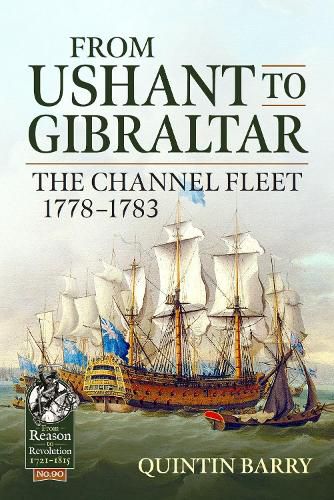From Ushant to Gibraltar: The Channel Fleet 1778-1783
Quintin Barry

From Ushant to Gibraltar: The Channel Fleet 1778-1783
Quintin Barry
In 1778, when the expected war finally broke with France, Lord Sandwich, the long serving First Lord of the Admiralty, had to find the resources to match the French fleet not only in the Channel but in other theatres of war such as the West Indies, the Mediterranean and the Indian Ocean. In addition, the Royal Navy had to protect Britain’s extensive maritime commerce, covering the large inbound and outbound convoys on which the country’s economy depended. This book is a study of the men who led and the men who managed, both afloat and ashore, the Channel Fleet. In 1778 it was commanded by Admiral Augustus Keppel; third in command was a member of the Board of Admiralty, Vice Admiral Hugh Palliser. On 27 July it engaged the French fleet commanded by d'Orvilliers. The battle was inconclusive, both sides claiming the victory. During the battle Palliser’s flagship suffered particularly. At the time, no issue arose between Keppel and Palliser as to the course the battle, but when, in late October, the latter came ashore he was shown a newspaper that suggested that he was to blame for Keppel’s failure to continue the battle. He was furious, but Keppel refused to sign a statement clearing Palliser’s name. The dispute escalated; Palliser demanded Keppel’s court martial but he was acquitted, as was Palliser himself when he to in his turn was court-martialled. The navy’s officer corps was profoundly divided, and it caused lasting damage. After Sandwich, the most important naval administrator was the outspoken Sir Charles Middleton, the Comptroller of the Navy. He was responsible for two key innovations
the coppering of ships hull’s which protected them against damaging marine growths and significantly increased their speed, and the introduction of the cannonade, a lighter cannon of shorter range but greater hitting power. Middleton enjoyed a close relationship with Richard Kempenfelt who was arguably the ablest sea officer on either side. With Lord Howe, Kempenfelt was responsible for the introduction of a new system of signalling. He won a striking victory when attacking a heavily defended French convoy in 1781 but tragically died in 1782 when his flagship the Royal George sank at her moorings at Spithead. Throughout the war the French and Spanish planned the invasion of southern England. The enormous Combined Fleet appeared first in the Channel in 1779, but although causing a panic when it arrived off Plymouth, it was suffering from an epidemic of smallpox and abandoned the attempt. In 1782, with the fall of Lord North’s ministry, Sandwich left the Admiralty. Vilified by nineteenth century writers, his reputation has been largely restored by more recent historians. AUTHOR: Quintin Barry is a solicitor and retired Employment Judge. He has also held a wide varirty of offices in both the public sectors, including the NHS and local radio. Following a lifelong interest in military and naval history, he is the author of a number of books in both fields. These include an acclaimed two volume history of the Franco Prussian War of 1870-1871; a history of the Austro Prussian War of 1866; and the first modern history of the Russo Turkish War of 1877-1878. He has also written a number of books of naval history, including a well reviewed account of the war in the North Sea in 1914-1918. 25 b/w images, 4 maps
This item is not currently in-stock. It can be ordered online and is expected to ship in approx 2 weeks
Our stock data is updated periodically, and availability may change throughout the day for in-demand items. Please call the relevant shop for the most current stock information. Prices are subject to change without notice.
Sign in or become a Readings Member to add this title to a wishlist.


